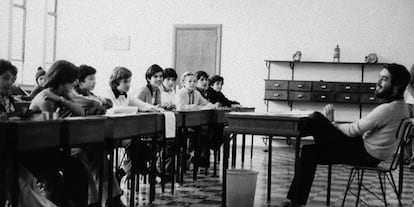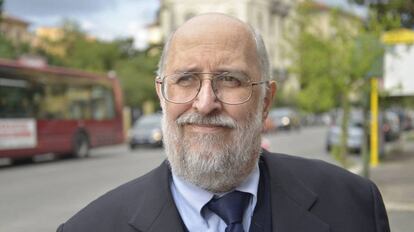EL PAÍS launched an investigation into pedophilia in the Spanish Church in 2018 and has a database updated with all known cases. If you know of any case that has not seen the light, you can write to us at: [email protected]. If it is a case in Latin America, the address is: [email protected].
───────────
The Pope has dealt a definitive blow, in its powerful economic networkto the Sodalicio de Vida Cristiana, the ultraconservative religious organization of Peru, with sect traits and inspired by the Spanish Falange, which spread since 1971 in the upper classes of the country and in several Latin American countries, and in recent years has received numerous complaints of pedophilia, sexual abuse and power. The Vatican nunciature in Peru released a statement on Tuesday morning, late afternoon in Spain, announcing the expulsion of the priest Jaime Manuel Baertl Gómez and the consecrated layman Juan Carlos Len Álvarez, two of the main architects of the business network grown around the group, accused of enriching itself with opaque practices and diverting funds to tax havens. The victims had protested precisely this week because they have not received compensation while the organization maintained a huge hidden asset.
The Vatican note indicates the responsibility of both “in numerous irregularities and illicit acts committed by companies linked to the Sodalicio.” Furthermore, “the seriousness of the sexual abuse committed by one of the accused has been considered.” It is not clear which of the two it is, but Baertl has already been publicly accused of abuse by victims. This culminates, for the moment, the cleanup operation undertaken by the Pope this summer, when he sent two of his trusted men, the Spanish Jordi Bertomeu and the Maltese archbishop Charles J. Scicluna, to Peru to investigate the Sodalicio. The organization has already admitted 67 victims of abuse, but has not recognized many others, estimated to be at least a hundred.
The Pontiff expelled the founder, Luis Fernando Figariin August. In September, at ten important members of the leadershipamong them an archbishop. This Tuesday expelled two others. With those of this Wednesday there are already 15. In addition, he excommunicated two laymen linked to the organization who denounced Bertomeu to the Peruvian Prosecutor’s Office, a maneuver to cast suspicion on the papal emissaries.

The Vatican points out in its new note that “some economic efforts and investments promoted by Baertl and Len within the Sodalitium of Christian Life constitute sinful actions that betray the Gospel.” “They are intolerable canonical illicit acts that, beyond the scandal that has arisen internationally, disfigure the evangelizing mission of the Church and severely undermine its credibility,” he concludes.
Furthermore, he adds an observation on a delicate point, the Holy See’s own relations with Peru, given that the Sodalicio took advantage of the 1980 concordat between the two States to grow its economic empire without paying taxes. The statement warns that the organization’s practices “endanger the healthy cooperation that regulates relations between the Church and the Peruvian State.”
Paola Ugaz, the Peruvian journalist who, together with Pedro Salinas, uncovered the scandal starting in 2015, explains that Baertl “is the brain of Sodalicio’s finances.” Martin Scheuch, one of the victims who has led the complaints, defines him as “Figari’s right hand for everything that involved relationships with businessmen and doing business.” “He made contacts with a very folksy style, he communicated with obscene and vulgar words, to demonstrate spontaneity, which was in the same codes,” he recalls. Baertl was ordained in 1980, but according to this victim he was always very pragmatic and focused on getting money. “I had no scruples. He said that God forgives that you are an asshole, but does not forgive that you are a lame, the translation into Iberian Spanish would be that God forgives that you are devious, but not that you are an asshole,” explains Scheuch.
Ugaz, who has suffered judicial persecution as a result of his articles, believes that the papal decision “is a clear warning, he says that what is coming is going to be hard, that now they do have to think about the victims, who are many, and that they have to take steps to clarify how they have moved their businesses using the concordat.” The Peruvian reporter reports that Sodalicio began making money in 2000 through the construction of cemeteries. He managed to have those he owned considered “missions”, exempt from taxes, thanks to a forced interpretation of the concordat endorsed by two canonists, the Spanish Luis Martínez Sistach, later cardinal and archbishop of Barcelona, and the Italian Gianfranco Ghirlanda. From there they built a network of nine luxury cemeteries throughout the country, with the complicity of as many local bishops, who earned up to 50% more than the rest, “they made a lot of money, which allowed them to set up other businesses.” El Sodalicio has interests in the real estate, agricultural and mining sectors, among others.
The journalist explains that in Piura, where José Antonio Eguren, the archbishop of Sodalicio expelled in September, was, the organization created “export companies, real estate companies, an entire city at their disposal, with de facto power like the archbishop, who was as powerful like the prosecutor’s office or the governor, and they fueled an economic empire that reached a billion dollars.” Starting in 2015, when journalistic investigations began to bring their businesses to light, Ugaz continues, “they moved the accumulated money through companies offshore, first to Panama and then to Denver, United States, where its main center is now.”

The Vatican suggests in its note that it will intervene in this entire framework: “Based on the principles of commutative justice and with the aim of repairing the injustice committed with the private appropriation and use of what should be social goods of some companies linked to Sodalicio (…) forceful measures have been taken to correct such reprehensible actions and prevent their repetition in the future.”
Scheuch declares himself “partly satisfied, it is what had to be done, but it still needs to be done.” “It is insufficient, as long as things remain at the level of expelling people, a definitive solution will not be reached. What is behind everything is the culture of abuse that permeates the entire Sodalicio. It is a system made to abuse people under the façade of a militant religious formation. We must make the Sodalicio disappear, the entire system,” he reflects. It is the same position that the cardinal-elect and archbishop of Lima, Carlos Castillo Mattasoglio, expressed last week. in an article in EL PAÍS.
For Scheuch, the most important thing is “to point out that this system is corrupt, it is rotten and has harmed many people.” He explains that the training of the members of the Sodalitium “is a way to destructure the personality, dominate the conscience and the will and practically brainwash. Overcoming it takes decades,” he concludes.

